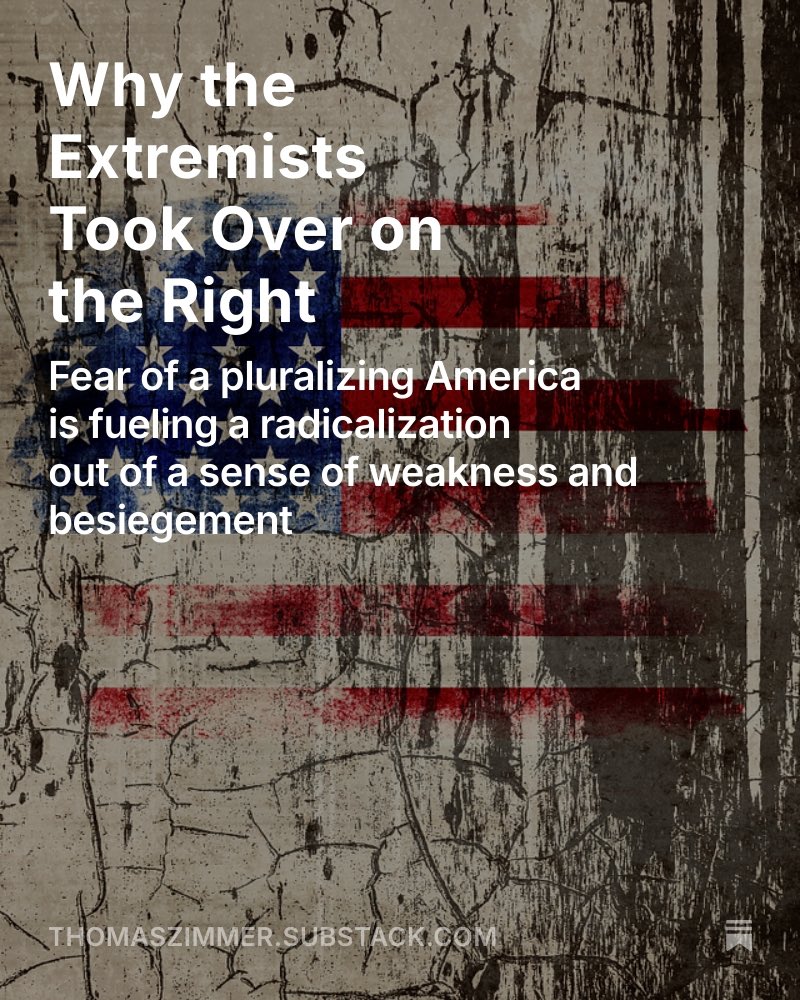As 2021 comes to an end, what is the state of American democracy?
The reactionary counter-mobilization against democracy has accelerated. It’s happening on so many fronts simultaneously that it’s easy to lose sight of how things are connected. Thoughts on the big picture: 1/
The reactionary counter-mobilization against democracy has accelerated. It’s happening on so many fronts simultaneously that it’s easy to lose sight of how things are connected. Thoughts on the big picture: 1/
So many things are happening at the federal, state, and local levels all around the country that are directly tied to the broader struggle over whether or not America should finally realize the promise of multiracial, pluralistic democracy. That’s the defining conflict. 2/
In Washington, Republicans have adopted a position of total obstruction (what else is new?), very much including the obstruction of any attempt to investigate a violent attack on the Capitol. But it’s the state level where the reactionary project has accelerated most. 3/
States passing extreme gerrymanders; or anti-“CRT” laws; and functionally banning abortion; school board meetings becoming battlefields; Kyle Rittenhouse is celebrated as a conservative hero; elected officials talking about burning books… these are not disparate events. 4/
The overriding concern for the Republican Party, which is solely focused on the sensibilities, anxieties, and interests of (wealthy) white conservatives, is to maintain traditional political, social, cultural, and economic hierarchies. 5/
Republicans don’t call it “maintaining traditional hierarchies,” of course - they call it preserving “real” America, by which they mean a predominantly white, Christian, patriarchal nation. America, to them, is supposed to be a place where white Christian men are at the top. 6/
Due to political, cultural, and most importantly demographic changes, Republicans do not have majority support for their political project anymore – certainly not on the federal level, and even in “red” states, their position is becoming increasingly tenuous. 7/
No one understands this better than Republicans themselves: They feel their backs against the wall, therefore they are determined to do whatever it takes, regardless of how radical, to protect their hold on power and preserve existing hierarchies and the traditional order. 8/
Republicans see Democrats not as a political opponent, but as an Un-American enemy that must not be allowed to govern and destroy “real” America. Everything else follows from that understanding of the political conflict. (Small-d) democrats they are not. 9/
Republicans understand that in a functioning democratic system, they would have to either widen their focus beyond the interests and sensibilities of white conservatives, which they are not willing to do; or relinquish power, which they reject. They chose a different path: 10/
It all starts with not letting too many of the “wrong” people vote. This year alone, Republican lawmakers have introduced hundreds of bills intended to make voting more difficult – and have enacted such laws almost everywhere they are in charge. 11/brennancenter.org/our-work/resea…
All of these voter suppression laws are ostensibly race-neutral and non-partisan, as they have always been in American history. But what is actually going on – who is targeted by these laws, and who is supposed to benefit – isn’t exactly hard to figure out. It’s not subtle. 12/
https://twitter.com/AriBerman/status/1473331157626458115
If too many of the “wrong” people are still voting, you make their electoral choices count less: through gerrymandering. Wisconsin has long been the poster child for these gerrymandering efforts – but they are happening everywhere, and they are accelerating and radicalizing. 13/
https://twitter.com/alfonslopeztena/status/1464049075788124161
If that is still not enough to keep the “wrong” side from winning, as happened in November 2020, you have to be in a position to nullify their win: We’re seeing election subversion efforts up and down the country – an all-out assault on state election systems. 14/
https://twitter.com/jonathanchait/status/1465749333240864782
Election commissions are being purged, local officials are being harassed, people who are a threat to Republican rule because they have demonstrated even a shred of allegiance to democracy and the rule of law are replaced by Trumpist loyalists. 15/
https://twitter.com/JonathanLanday/status/1468928424664252420
What if such blatant undermining of democracy leads to protests? Well, you criminalize those protests, by defining them as “riots,” and you declare “rioters” outlaws who do not deserve the protection of the law, not even when they’re physically attacked and killed. 16/
https://twitter.com/wihorne/status/1468241309278298115
And you make it clear how you think these pro-democracy “rioters” should be dealt with by encouraging white militants to use whatever force they please to suppress these protests, and by celebrating and glorifying those who have engaged in such violent fascistic fantasies. 17/
https://twitter.com/ronfilipkowski/status/1473116711029194757
Finally, Republicans are flanking all this by a broad-scale offensive against everything and everyone criticizing the legitimacy of white nationalist rule – past, present, and future. They clearly understand the importance of being in control of the national story. 18/
https://twitter.com/NBCNews/status/1473187010865250306
We need to pay attention to how these efforts are connected, and we have to acknowledge the underlying political project of entrenching white Christian patriarchal dominance by establishing one-party-rule systems. Can it really happen here? It is already happening. 19/
Republicans are not “delusional,” they haven’t temporarily “lost their mind.” Such pathologizing language obscures rather than illuminates the fact that Republicans are engaged in a deliberate, systematic, and highly successful project to abolish democracy. 20/
The American Right is fully committed to this anti-democratic project, and the Republican Party has a comprehensive strategy to put it into practice. Are enough people in positions of influence as committed to preserving democracy as Republicans are to abolishing it? 21/
2021 almost over, and so far, the pro-democracy camp – and the Democratic establishment, in particular – has failed to effectively counter this accelerating authoritarian onslaught. We are running out of time to save American democracy. Let’s act accordingly in 2022. /end
• • •
Missing some Tweet in this thread? You can try to
force a refresh






